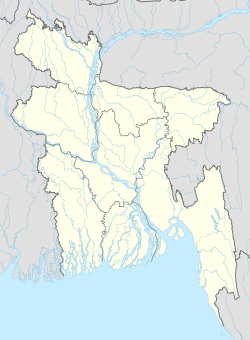 Barapukuria Coal Mine, Bangladesh | |
| Location | |
|---|---|
| Location | Chowhati, Parbatipur |
| Dinajpur | |
| Country | Bangladesh |
| Coordinates | 25°32′51.2″N88°57′38.6″E / 25.547556°N 88.960722°E |
| Owner | |
| Company | Barapukuria Coal Mining Company Limited, Petrobangla |
| Website | http://bcmcl.org.bd/ |
| Year of acquisition | 1997 |
Barapukuria Coal Mine is run by the Barapukuria Coal Mining Company Limited in Bangladesh. [1] Barapukuria Coal Mining Company Limited is a subsidiary of the state owned Petrobangla. [2] The mine is located at Parbatipur upazila in Dinajpur. This is the lone active coal mine in Bangladesh. [3]
